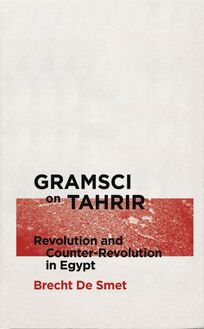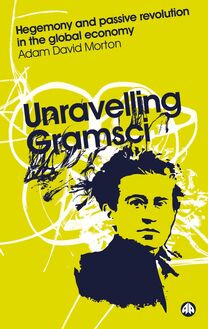-
 Univers
Univers
-
 Ebooks
Ebooks
-
 Livres audio
Livres audio
-
 Presse
Presse
-
 Podcasts
Podcasts
-
 BD
BD
-
 Documents
Documents
-
- Cours
- Révisions
- Ressources pédagogiques
- Sciences de l’éducation
- Manuels scolaires
- Langues
- Travaux de classe
- Annales de BEP
- Etudes supérieures
- Maternelle et primaire
- Fiches de lecture
- Orientation scolaire
- Méthodologie
- Corrigés de devoir
- Annales d’examens et concours
- Annales du bac
- Annales du brevet
- Rapports de stage
La lecture à portée de main
Vous pourrez modifier la taille du texte de cet ouvrage
Découvre YouScribe en t'inscrivant gratuitement
Je m'inscrisDécouvre YouScribe en t'inscrivant gratuitement
Je m'inscrisEn savoir plus
Vous pourrez modifier la taille du texte de cet ouvrage
En savoir plus

Description
‘Morton draws upon an impressive knowledge of Gramsci’s writings to provide new insights into key processes in today’s world order.’ Anne Showstack Sassoon, Emeritus Professor, Kingston University and Visiting Professor, Birkbeck College, University of London
Unravelling Gramsci makes extensive use of Antonio Gramsci’s writings, including his much-overlooked pre-prison journalism, prison letters, as well as his prison notebooks, to provide a fresh approach to understanding his contemporary relevance in the current neoliberal world order. Adam Morton examines in detail the themes of hegemony, passive revolution and uneven development to provide a useful way of analysing the contemporary global political economy, the project of neoliberalism, processes of state formation, and practices of resistance. The book explores the theoretical and practical limitations of how Gramsci’s ideas can be used today, offering a broad insight into state formation and the international factors shaping hegemony within a capitalist framework.
Acknowledgements
Abbreviations
List of figures
1. Introduction: the North/South question of uneven development
PART I: ENGAGING GRAMSCI
2. Historicising Gramsci: situating ideas in and beyond their context
3. State Formation, Passive Revolution and the International System
4. A Return to Gramsci: 'the moment of hegemony'
PART II: GRAMSCI, WORLD ORDER AND RESISTANCE
5. Hegemony and World Order: neo-Gramscian Perspectives and the
Global Political Economy
6. The Global Political Economy of Uneven Development
7. Globalisation and Resistance: the power of the powerless
References
Index
Sujets
Informations
| Publié par | Pluto Press |
| Date de parution | 20 février 2007 |
| Nombre de lectures | 0 |
| EAN13 | 9781783716838 |
| Langue | English |
Informations légales : prix de location à la page 0,2000€. Cette information est donnée uniquement à titre indicatif conformément à la législation en vigueur.
Extrait
Unravelling Gramsci
Reading Gramsci
General Editor: Joseph A. Buttigieg
Also available
Gramsci, Culture and Anthropology Kate Crehan
Language and Hegemony in Gramsci Peter Ives
Unravelling Gramsci
Hegemony and Passive Revolution in the Global Political Economy
Adam David Morton
First published 2007 by Pluto Press
345 Archway Road, London N6 5AA
www.plutobooks.com
Copyright © Adam David Morton 2007
The right of Adam David Morton to be identified as the author of this work has been asserted by him in accordance with the Copyright, Designs and Patents Act 1988.
British Library Cataloguing in Publication Data
A catalogue record for this book is available from the British Library
Hardback
ISBN-13 978 0 7453 2385 5
Paperback
ISBN-13 978 0 7453 2384 8
ePub
ISBN 978 1 7837 1683 8
Mobi
ISBN 978 1 7837 1682 1
Library of Congress Cataloging in Publication Data applied for
10 9 8 7 6 5 4 3 2 1
Designed and produced for Pluto Press by
Chase Publishing Services Ltd, Fortescue, Sidmouth, EX10 9QG, England
Typeset from disk by Stanford DTP Services, Northampton, England
Printed on Demand in the European Union by
CPI Antony Rowe, Eastbourne, UK
Contents
List of Figures
Reading Gramsci
Joseph A. Buttigieg
Acknowledgements
Abbreviations
1.
Introduction: the North/South Question of Uneven Development
The ‘North/South’ Question of Uneven Development
Organisation of the Book
PART I ENGAGING GRAMSCI
2.
Historicising Gramsci: Situating Ideas in and Beyond their Context
Interpretative Controversies
Historicising Gramsci
Conclusion: Past and Present
3.
State Formation, Passive Revolution and the International System
State Formation, Sovereign Territoriality and Capitalism
Machiavelli in Perspective: Renaissance Italy
Gramsci in Perspective: Towards the Italian Risorgimento
Conclusion: ‘the Riddle of History’
4.
A Return to Gramsci: ‘The Moment of Hegemony’
From L’Ordine Nuovo and the Biennio Rosso to the Quaderni del Carcere
The ‘Moment of Hegemony’ and Ethico-political History
Historical Bloc and ‘Counter’hegemony: Theoretical and Practical Aspects
Juxtaposing the ‘National’ Point of Departure and ‘the International’
‘Americanism and Fordism’
Conclusion: ‘Resisting “Encrocement”’
PART II GRAMSCI, WORLD ORDER, AND RESISTANCE
5.
Hegemony and World Order: Neo-Gramscian Perspectives and the Global Political Economy
A Critical Theory Route to Hegemony, World Order, and Historical Change
The Constitution of Hegemony
Pax Americana and Globalisation
From the Internationalisation of the State to Globalisation
Welcome Debate: Controversies Surrounding Neo-Gramscian Perspectives
Conclusion: the Future of Hegemony?
6.
The Global Political Economy of Uneven Development
Contesting the Transnational State
The Passive Revolution of Capital
The History of Mexico Seen as a Struggle of ‘Passive Revolution’?
Conclusion: the Shifting Sands of Hegemony
7.
Globalisation and Resistance: the Power of the Powerless
A Methodological Approach to Analysing Subaltern Classes
Subaltern Class Agency and Changes to the Social Relations of Production
The Accumulation Strategy of Neoliberalism and Agrarian Reform
Aspects of ‘Counter’hegemonic Struggle and the Power of the Powerless
Conclusion: Subaltern Class Struggle and the Power of the Powerless
8.
Conclusions against the Prison Notebooks
Summary of the Book
Conclusions against the Prison Notebooks
Conclusion: ‘the Revolutionary Tide’
Notes
Bibliography
Index
List of Figures
4.1
The relations of force
4.2
The political relation of hegemony
5.1
The dialectical relation of forces
5.2
The dialectical moment of hegemony
6.1
Geopolitical relations and ‘the international’
Reading Gramsci
General Editor: Joseph A. Buttigieg
Antonio Gramsci (1891–1937), little known outside communist circles at the time of his death, is now one of the most frequently cited and widely translated political theorists and cultural critics of the twentieth century. The first wave of interest in Gramsci was triggered by the publication, in Italy, of his prison writings, starting with the letters, which appeared in 1947, and continuing with the six volumes of the thematic edition of the notebooks, the last of which was brought out in 1951. Within the space of a few years, hundreds of articles and books were written explicating, analysing and debating Gramsci’s concept of hegemony, his revisionist views on the history of Italy’s unification, his anti-economistic and antidogmatic version of Marxist philosophy, his theory of the state and civil society, his anti-Crocean literary criticism, his novel approach to the study of popular culture, his extensive observations on the role of intellectuals in society, along with other aspects of his thought. Although long dead, Gramsci became more than an object of dispassionate study; the intensity of the discussions surrounding his work and the often heated struggle over his legacy had, and continue to have, a profound effect on the political culture and cultural politics of postwar Italy.
During the late 1960s and the 1970s Gramsci’s name and ideas started circulating with increasing frequency throughout Europe, Latin America, and North America (and, to a lesser extent, elsewhere too). The various currents associated with Eurocommunism and the ‘New Left’ that accompanied the swell of interest in what came to be known as ‘western Marxism’ contributed immensely to Gramsci’s rise to prominence during this period. In the anglophone world, the publication, in 1971, of Quintin Hoare and Geoffrey Nowell Smith’s superbly edited Selections from the Prison Notebooks made it possible for scholars to move from vague and general allusions to Gramsci to serious study and analysis of his work. Gramscian studies were further bolstered by various editions in diverse languages of the pre-prison writings – which, among other things, drew attention to the valuable essay on the Southern Question – and by the publication, in Italy, of Valentino Gerratana’s complete critical edition of the Quaderni del carcere (1975).
Gramsci’s influence became even more pronounced in the 1980s with the spread of cultural studies, the growing fascination with the question of ‘power’, and the greater attention that scholars from different disciplines were devoting to the relations among culture, society, and politics. The rapid decline of interest in Marxist thought following the events of 1989 had no effect on Gramsci’s ‘fortunes’. By that time, as Stuart Hall was among the first to point out, Gramsci had already ‘radically displaced some of the inheritances of Marxism in cultural studies’. Indeed, Gramsci’s ideas have come to occupy a very special position in the best known of post-Marxist theories and strategies by the political left. Furthermore, the ubiquitous concern with the concept of civil society during the past 15 years has rekindled interest in Gramsci’s reflections on the subject. Likewise, many of the issues and topics that currently preoccupy a broad spectrum of academic intellectuals – subaltern studies, postcolonialism and North–South relations, modernity and postmodernity, the relation between theory and praxis, the genealogy of Fascism, the socio-political dimensions of popular culture, hegemony and the manufacturing of consent, etc. – have motivated many a reading and rereading of Gramsci’s texts.
In the 50 years since Gramsci first became an ‘object’ of study, his theories and concepts have left their mark on virtually every field in the humanities and the social sciences. His writings have been interpreted, appropriated, and even instrumentalised in many different and often conflicting ways. The amount of published material that now surrounds his work – John Cammett’s updated Bibliografia gramsciana comprises over 10,000 items in 30 languages – threatens to overwhelm even the trained scholar and to paralyse or utterly confuse the uninitiated reader. Yet the sheer size of the Gramscian bibliography is also an important indication of the richness of Gramsci’s legacy, the continuing relevance of his ideas, and the immensity of his contribution to contemporary thought. In many respects, Gramsci has become a ‘classic’ that demands to be read. Reading Gramsci, however, is not quite an easy undertaking; his most important writings are open-ended, fragmented, multidirectional explorations, reflections, and sketches. His prison notebooks have the character of a cluttered, seemingly disorganised intellectual laboratory. The well-trained scholar, no less than the first-time reader, would welcome an expert guide who could point to the salient features of Gramsci’s work and bring into relief the basic designs underlying the surface complexity of different parts of his massive oeuvre. Similarly, a critical exposition of the most important existing treatments of Gramsci’s works, together with a discussion of the potential usefulness of his insights to certain current lines of inquiry in the humanities and social sciences, would enable readers of Gramsci to appreciate better why (and in what ways) his ideas have a bearing on discussions about some of the most pressing social, cultural, and political issues of our time.
The multifaceted character of Gramsci’s writing and the rich diversity of critical and theoretical work it has inspired cannot be treated effectively in a single, comprehensive study. A series of monographs, each dealing with a specific aspect of his work (but also cognisant of the many threads that link its various parts), would be a much more useful companion to the reader
-
 Univers
Univers
-
 Ebooks
Ebooks
-
 Livres audio
Livres audio
-
 Presse
Presse
-
 Podcasts
Podcasts
-
 BD
BD
-
 Documents
Documents
-
Jeunesse
-
Littérature
-
Ressources professionnelles
-
Santé et bien-être
-
Savoirs
-
Education
-
Loisirs et hobbies
-
Art, musique et cinéma
-
Actualité et débat de société
-
Jeunesse
-
Littérature
-
Ressources professionnelles
-
Santé et bien-être
-
Savoirs
-
Education
-
Loisirs et hobbies
-
Art, musique et cinéma
-
Actualité et débat de société
-
Actualités
-
Lifestyle
-
Presse jeunesse
-
Presse professionnelle
-
Pratique
-
Presse sportive
-
Presse internationale
-
Culture & Médias
-
Action et Aventures
-
Science-fiction et Fantasy
-
Société
-
Jeunesse
-
Littérature
-
Ressources professionnelles
-
Santé et bien-être
-
Savoirs
-
Education
-
Loisirs et hobbies
-
Art, musique et cinéma
-
Actualité et débat de société
- Cours
- Révisions
- Ressources pédagogiques
- Sciences de l’éducation
- Manuels scolaires
- Langues
- Travaux de classe
- Annales de BEP
- Etudes supérieures
- Maternelle et primaire
- Fiches de lecture
- Orientation scolaire
- Méthodologie
- Corrigés de devoir
- Annales d’examens et concours
- Annales du bac
- Annales du brevet
- Rapports de stage













